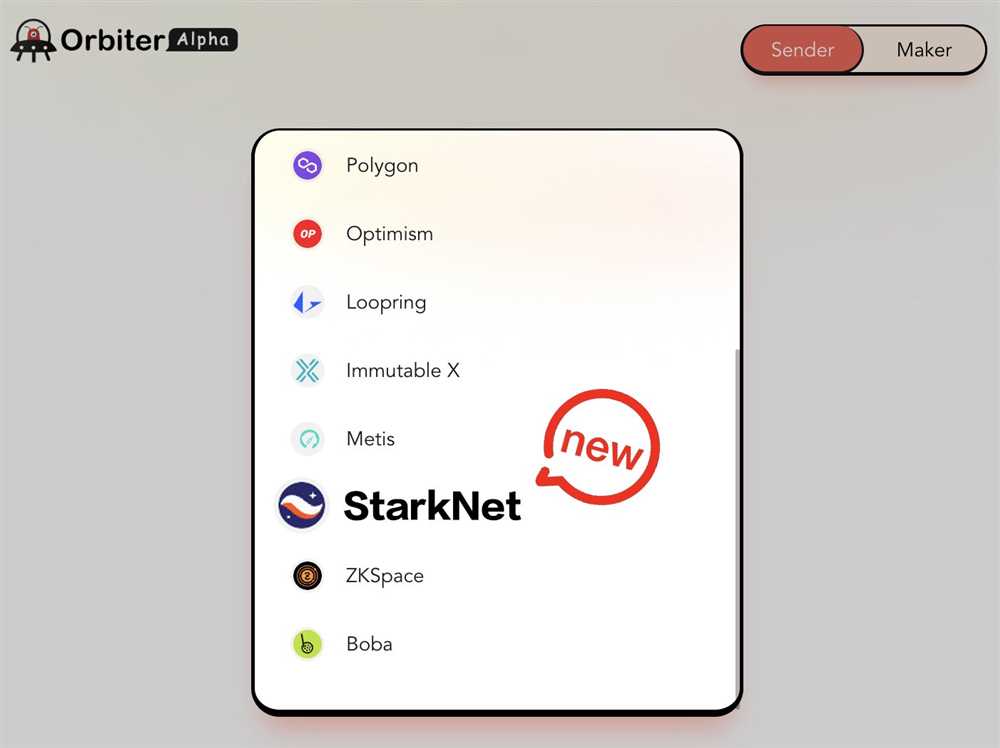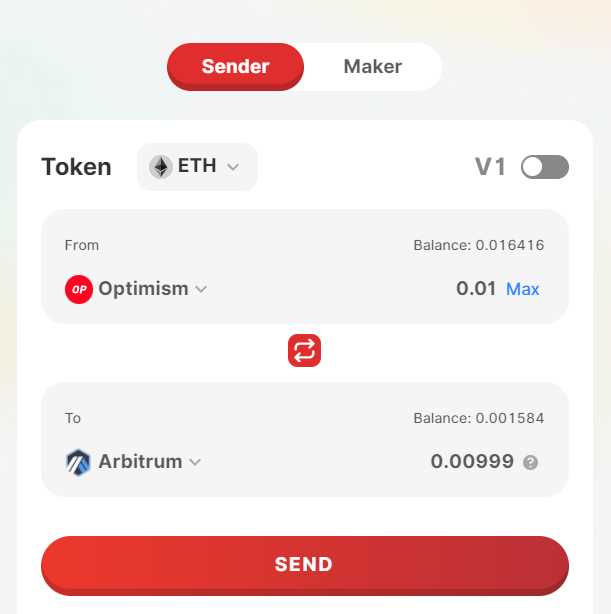
Orbiter Finance Developer’s Guide: A Comprehensive Resource for Creating Decentralized Applications

Welcome to the Orbiter Finance Developer’s Guide, a comprehensive resource for building decentralized applications (dApps) on the Orbiter Finance platform. Whether you are a seasoned developer or just starting out, this guide will provide you with the tools and knowledge you need to create innovative and secure dApps that leverage the power of blockchain technology.
Orbiter Finance is a next-generation decentralized finance (DeFi) protocol built on the Ethereum blockchain. With Orbiter Finance, developers can create and deploy financial applications that are secure, transparent, and trustless. By utilizing smart contracts, Orbiter Finance enables users to trade, lend, borrow, and earn interest on their assets without the need for intermediaries or centralized authorities.
In this guide, you will learn how to navigate the Orbiter Finance ecosystem, understand the core components of the protocol, and utilize the various tools and libraries available to developers. You will also discover best practices for designing and developing dApps that are secure, scalable, and user-friendly. Whether you are interested in creating your own decentralized exchange, lending platform, or yield farming application, this guide will walk you through the process from start to finish.
So, if you’re ready to unlock the potential of decentralized finance and revolutionize the way people interact with financial services, dive into the Orbiter Finance Developer’s Guide and start building your dApp today!
Understanding the Orbiter Finance Ecosystem
The Orbiter Finance ecosystem is a decentralized finance platform that aims to provide users with a range of financial services and products. It is built on the Ethereum blockchain and leverages smart contracts to enable trustless and transparent transactions. The ecosystem consists of several key components:
1. Orbiter Token (ORB): The native cryptocurrency of the Orbiter Finance ecosystem. ORB tokens are used for various purposes within the platform, including governance, staking, and as a medium of exchange.
2. Orbiter Vaults: Vaults are smart contracts that allow users to lock their assets and earn interest or yield through various investment strategies. Vaults provide a secure and automated way to generate passive income.
3. Orbiter Swap: The swap feature enables users to exchange different tokens within the Orbiter Finance ecosystem. It integrates with external decentralized exchanges and aggregators to provide liquidity and competitive rates.
4. Orbiter Governance: The governance module empowers ORB token holders to participate in the decision-making process of the Orbiter Finance ecosystem. It allows token holders to vote on proposals and influence the future direction of the platform.
5. Orbiter Staking: Staking ORB tokens allows users to earn additional rewards, such as yield farming incentives or protocol fees. Staked tokens contribute to the security and stability of the network.
6. Orbiter Insurance: The insurance feature provides protection against smart contract vulnerabilities and potential hacks. Users can purchase insurance coverage to mitigate risks associated with their investments.
The Orbiter Finance ecosystem aims to provide a decentralized and user-friendly platform for individuals to access various financial services. By leveraging blockchain technology, it offers transparency, security, and opportunities for yield generation.
Disclaimer: The information provided here is for informational purposes only and should not be considered financial advice. Users should conduct their own research and due diligence before participating in the Orbiter Finance ecosystem.
Getting Started with Orbiter Finance Developer’s Guide

Welcome to the Orbiter Finance Developer’s Guide! This guide is designed to help developers get started with building decentralized applications (dApps) on the Orbiter Finance platform. Whether you are new to blockchain development or an experienced developer, this guide will provide you with the necessary information to start building on Orbiter Finance.
Prerequisites
Before you begin developing on Orbiter Finance, there are a few prerequisites you should have:
- A basic understanding of blockchain technology and smart contracts.
- A development environment set up for blockchain development. This could be a local development environment or a cloud-based development environment.
- Familiarity with the Solidity programming language.
- An Ethereum wallet for testing and deploying your dApps.
Setting Up Your Development Environment
Once you have met the prerequisites, you can start setting up your development environment. The Orbiter Finance platform is built on Ethereum, so you will need to install the necessary tools and libraries for Ethereum development.
Here are the main steps to set up your development environment:
| Step | Description |
|---|---|
| Step 1 | Install Node.js and npm |
| Step 2 | Install Truffle |
| Step 3 | Install Ganache |
| Step 4 | Set up a new project directory |
| Step 5 | Initialize your project with Truffle |
Once you have completed these steps, you will have a fully set up development environment for building on Orbiter Finance.
Next, you can explore the different features and functionalities of Orbiter Finance by referring to the Orbiter Finance API documentation and the provided sample code.
Happy building!
Exploring the Features and Functionalities
Orbiter Finance offers a range of innovative features and functionalities that are designed to empower developers in building decentralized applications (dApps) with ease. In this section, we will explore some of these key features:
1. Decentralized Data Storage
Orbiter Finance provides a decentralized data storage system that allows developers to securely store and retrieve data for their dApps. This ensures the integrity and reliability of the stored data, as it is distributed across multiple nodes in the network.
2. Smart Contracts

Smart contracts are a core component of Orbiter Finance’s platform. Developers can leverage smart contracts to define the business logic of their dApps and automate the execution of transactions. These smart contracts are executed in a decentralized and trustless manner, removing the need for intermediaries.
3. Cross-Chain Interoperability
Orbiter Finance is built on a cross-chain interoperability protocol, allowing developers to interact with multiple blockchains seamlessly. This enables the creation of dApps that can leverage the features and assets of different blockchain networks, increasing their flexibility and functionality.
4. Liquidity Pool Integration

Developers can integrate liquidity pools into their dApps using Orbiter Finance’s built-in integration capabilities. Liquidity pools enable the efficient exchange and swapping of assets, providing developers with more options for building decentralized financial applications.
5. Governance Mechanism
Orbiter Finance incorporates a governance mechanism that allows token holders to participate in the decision-making process of the platform. This ensures that the development and evolution of the platform is community-driven and transparent, fostering a decentralized ecosystem.
6. User-Friendly Interface
To facilitate a seamless user experience, Orbiter Finance offers a user-friendly interface that makes it easy for users to interact with dApps built on the platform. This includes features such as intuitive navigation, clear instructions, and responsive design, enhancing the overall accessibility of the dApps.
In conclusion, Orbiter Finance provides developers with a comprehensive set of features and functionalities that empower them to build powerful and user-friendly decentralized applications. By leveraging these capabilities, developers can unlock the full potential of blockchain technology and create innovative solutions for different industries.
| Key Features | Functionalities |
|---|---|
| Decentralized Data Storage | Securely store and retrieve data for dApps |
| Smart Contracts | Automate execution of transactions |
| Cross-Chain Interoperability | Interact with multiple blockchains seamlessly |
| Liquidity Pool Integration | Efficient exchange and swapping of assets |
| Governance Mechanism | Token holders participate in decision-making |
| User-Friendly Interface | Easy navigation and intuitive design |
Best Practices for Building Decentralized Applications on Orbiter Finance

As you build decentralized applications (DApps) on Orbiter Finance, it’s important to follow best practices to ensure the smooth operation and security of your applications. Here are some guidelines to consider:
1. Understand Orbiter Finance Architecture

Before diving into development, make sure you have a thorough understanding of Orbiter Finance’s architecture, including its smart contracts, data models, and transaction structures. Familiarize yourself with the different components and how they interact with each other.
2. Design Intuitive User Interfaces
User experience is crucial for the success of your DApp. Design intuitive and user-friendly interfaces that make it easy for users to interact with your application. Provide clear instructions, feedback, and error handling to enhance the overall user experience.
3. Implement Robust Security Measures
Security is paramount when dealing with decentralized applications. Implement proper access controls, encryption, and authentication mechanisms to protect user data and prevent unauthorized access. Regularly test your application for vulnerabilities and stay updated with security best practices.
4. Optimize Gas Efficiency

Ethereum gas fees can be a significant cost for users. Optimize gas efficiency by minimizing unnecessary transactions, using efficient data structures, and optimizing your smart contracts. Consider implementing layer-2 scaling solutions to reduce transaction costs for your users.
5. Handle Blockchain Events and Errors

Listen to relevant blockchain events and handle errors gracefully. Implement error handling logic and provide clear messaging to users in case of issues. Monitor blockchain transactions and notify users of the status of their transactions.
6. Test Extensively
Thoroughly test your DApp before deployment. Test different scenarios, edge cases, and stress test your smart contracts to ensure their robustness. Use automated testing frameworks and implement comprehensive test suites to ensure the stability and reliability of your application.
7. Document and Maintain Your Code
Proper documentation is essential for the long-term maintenance and extensibility of your DApp. Document your code, including smart contracts, APIs, and any integrations. Regularly update and maintain your documentation as you make changes to your application.
By following these best practices, you can build decentralized applications on Orbiter Finance that are secure, user-friendly, and efficient. Continuously learn and stay updated with the latest developments in the decentralized finance space to enhance the quality of your applications.
Q&A:
What is Orbiter Finance?
Orbiter Finance is a decentralized finance (DeFi) platform that allows users to build and deploy their own decentralized applications (dApps) on the Ethereum blockchain.
How can I start building decentralized applications on Orbiter Finance?
To start building decentralized applications on Orbiter Finance, you will need to familiarize yourself with the Orbiter Finance Developer’s Guide. This guide provides detailed documentation and step-by-step instructions on how to build and deploy dApps on the platform.
What programming languages can I use to build decentralized applications on Orbiter Finance?
You can use Solidity, which is a programming language specifically designed for writing smart contracts on the Ethereum blockchain, to build decentralized applications on Orbiter Finance. Solidity is similar to JavaScript and allows you to define data structures, functions, and more.
Can I integrate my existing dApp with Orbiter Finance?
Yes, you can integrate your existing dApp with Orbiter Finance. The platform provides a set of APIs and developer tools that allow you to interact with the Ethereum blockchain and leverage the features and functionality of Orbiter Finance in your application.
What are the benefits of building decentralized applications on Orbiter Finance?
The benefits of building decentralized applications on Orbiter Finance include the ability to leverage the security, transparency, and immutability of the Ethereum blockchain, access to a wide range of DeFi protocols and services, and the ability to easily integrate and interact with other dApps on the platform.


